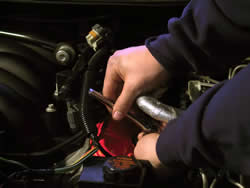
Powertrain offers complete electronic engine and transmission calibration service.
Currently, all production vehicles use Electronic Fuel Injection (EFI) systems. With this engine control system, fuel is metered and spark is adjusted by the on-board called the Electronic Control Module (ECM).  Various sensors monitor many engine parameters such as the engine RPM, manifold pressure, coolant temperature, throttle position, etc. This data is then used to calculate the amount of air (speed density method) or measure by means of a mass air flow (MAF) and then determines the amount of air is in each cylinder. With this information ECM calculates the amount of fuel that is to be injected through the Throttle Body Injector (TBI) or Port Fuel Injectors (PFI) to achieve optimal performance.
Various sensors monitor many engine parameters such as the engine RPM, manifold pressure, coolant temperature, throttle position, etc. This data is then used to calculate the amount of air (speed density method) or measure by means of a mass air flow (MAF) and then determines the amount of air is in each cylinder. With this information ECM calculates the amount of fuel that is to be injected through the Throttle Body Injector (TBI) or Port Fuel Injectors (PFI) to achieve optimal performance.
Electronic Fuel Injection (EFI) is generally more efficient than carburetor because it is able to compensate for variable operating conditions. The calculation is performed by the Electronic Control Module (ECM) and constantly adjusts the fuel flow to match the amount of air intake. This allows the system to deliver the optimum fuel mixture needed for good response, economy, and overall power. However, all EFI systems have there limitations. An EFI system is does not have the ability to actively alter fuel flow to completely compensate for variations in air-flow due to engine modifications. The ECM of a fuel injected engine is permanently programmed at the factory to operate with a stock engine. For example, you may have an engine that performs excellent with the OEM camshaft and heads, but will suffer a great loss of power, throttle response, or fuel economy when any engine component is changed to increase power. These modifications can be as a new low restriction air filter, supercharger, turbocharger, camshaft, exhaust headers, low restriction catalytic converter or muffler. This is because the amount of air entering the engine changed, but the ECM cannot correctly inject the correct quantity of fuel, resulting in a mixture that is too rich or too lean.
Powertrain Electronics provides a complete electronic engine and transmission calibration service. The main objective for this service is GM vehicles using the OEM ECM engine controller. We also are perform calibrations when using any aftermarket ECM. This service is available for all GM pickups with TBI electronic fuel injection, cars and performance vehicles. When an engine is modified, the PROM or FLASH calibration program should be updated to match the fuel and spark needs of engine. Each engine can be optimized for a particular intake manifold, camshaft, head and exhaust combination. Power will be improved by providing the engine with the correct air-fuel ratio and spark timing. When your application use an aftermarket engine controller like DFI, Accel, Haltech, Motec or Autronics, a correctly calibrated engine could be your ticket for a completely optimized engine for the best power and performance.




